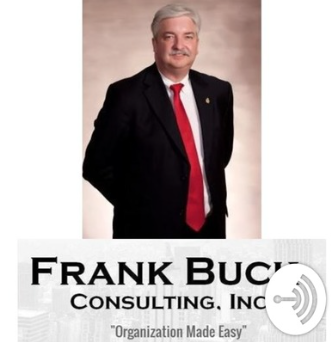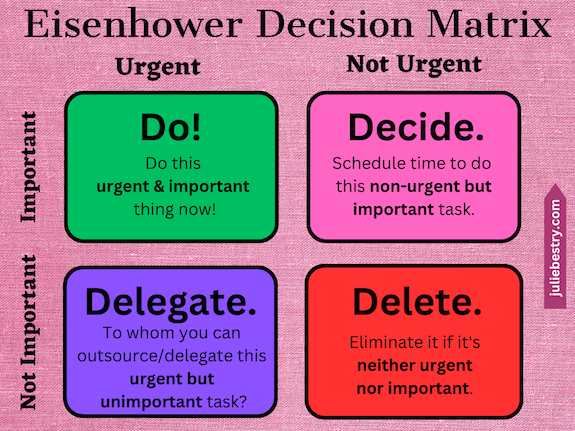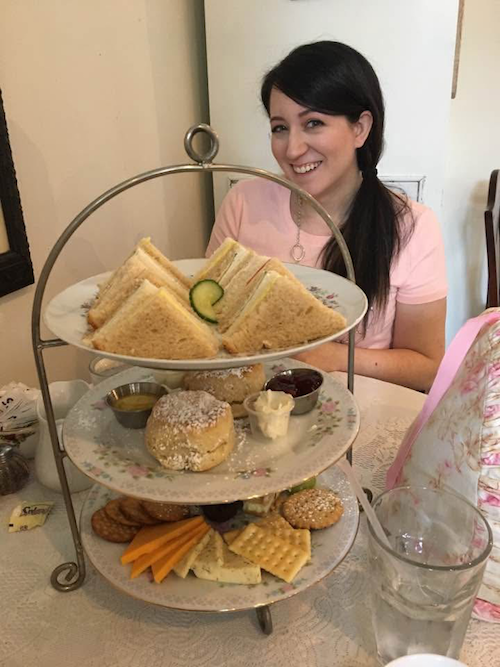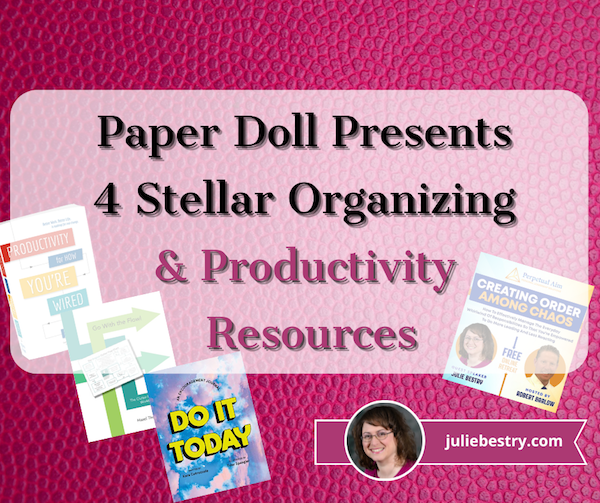Whoopsie! What To Do When Your Week Doesn’t Go As Planned

This isn’t the post I planned to write today.
And last week’s post never got written. In fact, last week did not go as planned at all. It went BOOM!
VERTIGO, BUT WITHOUT JIMMY STEWART
It all started last Sunday evening. I was chatting on the phone with a friend and getting ready to start writing a post for Janet Barclay’s excellent monthly Organizing and Productivity Blog Carnival. Usually I submit a post from the Paper Doll vault, but this time I wanted to write a new post, specifically for the carnival. (We’ll get to that later.)
As my friend and I were talking, I sat on the edge of the bed and then lay down to stretch my back. Immediately, I was overcome with a powerful sense of vertigo — not mere dizziness, or as though the room were spinning, but as though I weighed tons and was going to go barreling through the Earth. While it was not the worst I’ve felt in my entire life, it would rank in the top three.

Publicity Poster from Alfred Hitchcock’s 1958 Vertigo
I’ve had benign paroxysmal positional vertigo (BPPV) twice before, and both times it was quickly dispatched by a seemingly magical series of movements called the Epley Maneuver. I’ve seen it be such a freaking miracle that I’m a typical explanatory video in this post. (Think of it as organizing for the inner ear!)
Unfortunately, this time, Epley let me down.
The next six hours seemed to pass like jump-takes in a movie. It was 6:35 p.m. and I was on the phone with Paper Mommy. The next thing I knew, it was almost an hour later. And then another hour. My insurance company has Teladoc built-in, and I’d previously registered, so I used the app to reach a physician for a video consult.
As a professional organizer, here’s how I thought it should work: I register for everything in advance (which I had). I click the button and provide my reason for seeking an appointment (which I did). And then I’d be connected with a medical professional.
Nope.
Although I registered for Teladoc when it first became available, I still had to try to type/dictate my medical history, all while lying flat on the floor and spinning. And I had to provide the address and phone number of my pharmacy…which was written on my prescription bottles…in the other room. (Crawling was agonizing. Have you ever seen someone try to do the backstroke on plush carpet? It was not pretty.)
After all that, I got a message saying someone would be with me within ten minutes. Then a message saying that {name redacted} was reading my file. Then a message saying, “Oops, sorry, we’ve canceled your video appointment. If you still need help, please try to schedule another Teladoc appointment.” Seriously?!
As I went through the entire process again, I noted the clock on my phone. I’d have sworn only minutes had passed, but almost another hour had gone by.
I’ll spare you readers the sordid medical details, but by the time I finally spoke to a Teladoc physician, I was instructed to call 911. When I asked why, the response was troubling enough that I only asked if someone could just take me to the ER.
I live upstairs. The prospects of having to go downstairs by myself to let first responders in or having them break down my door were equally unpleasant. Instead, I called my local bestie, Jen, to see if her husband could stay with her kids, and she immediately headed over to take me to the emergency room.
Moms know everything! She arrived with all sorts of Mom Emergency Paraphernalia, including an old-fashioned ice pack.
Although the panic was secondary to the rollicking vertigo and related symptoms, Paper Doll offers a full-service blog atmosphere, so may I also share this advice from Valera Health’s Mastering the Art of Panic Attack Prevention: From Panic to Peace (bolded emphasis is mine):
The keywords here are ice and sweets. If you’re able to, grab a cold washcloth, water bottle or ice cube and rub it on your face. Panic attacks can induce hot flashes so cold stimuli may help you to cool down and calm down, which in turn can shorten panic attacks and make them more bearable. Another way to try this type of sensory grounding is to quickly dunk your head or face under cold water (make sure the water isn’t too freezing first!).
Some people prefer to do the “sour candy trick” instead by sucking on a super sour candy when feeling panicked. The tart taste helps with refocusing and shifting attention away from the symptoms of a panic attack. If you’re prone to panic attacks, we recommend carrying sour candy around whenever you’re out and about so you always have them handy, just in case.
MAKING SENSE IN THE AFTERMATH OF AN EMERGENCY
Once the emergency, itself, is over, you’re left mopping up the mess. Dealing with the aftermath of a natural disaster or a medical situation is usually more problematic than coping with your schedule, but eventually, you’re going to have to turn your eyes to the smoking piles of debris that used to be your carefully planned schedule.
You may not be able to do much right away. I collapsed into bed as soon as I got home from the ER. Though the meds they’d given me had me sleepy while there, my brain was spinning almost as much as the room had been. I had SO MUCH planned for the week prior to Thanksgiving. How would I get back on track?
The following are some of the concepts I put into practice. Whether you have a family emergency or just something that keeps you down for the count, these ideas should be useful until you can see a light at the end of the tunnel.
Assess the Damage
Whether you’ve taken to your bed with the flu or a tree has toppled across your driveway (as happened to so many after this hurricane season), you can’t take action right away. But when you do have a sane, cogent moment to breathe, grab your calendar and your To Do list, and either a pad and pen or a blank Word doc or Evernote note.
Don’t be listless! Take a moment to list everything in your schedule that was disrupted (or will be disrupted).
That first morning was a Monday. Normally I would have completed the weekly Paper Doll post on Sunday night and spent the day doing marketing tasks, sharing my post and those of my organizing colleagues. Again, I hadn’t written the post, which I’d intended to submit to the blog carnival, but even if I had, dragging myself to the computer and lifting my head to the screen was a non-starter. But the world wasn’t going to end because my post hadn’t shown up in someone’s mailbox or social media feed.
Later that day, I had an appointment to get my hair cut, and had blocked time to prepare for guesting on Frank Buck’s Get Organized! podcast on Tuesday.

Tuesday’s schedule included the podcast recording, a first-time physical therapy appointment, a two-hour co-writing session, and two webinars I’d planned to attend.
As the week went on, I had client sessions, prospect consultations, and the variety of life activities (bill-paying, shopping, preparing for this week’s Thanksgiving adventures) that everyone has.
In addition, I had to figure out how (when the world was still spinning, though at a slightly less malevolent pace) to get my prescriptions filled and talk to my own physician regarding some things I suspected I’d need beyond what the ER had advised.
When I floated up into consciousness on Monday, at least I knew what was on my plate.
Prioritize Key Activities
In Use the Rule of 3 to Improve Your Productivity (which I invite you to read and embrace with all your heart and soul and calendar), I reviewed all the ways to manage your schedule and To Do list to keep life from getting in the way. But, as with my week last week, sometimes life is a giant elephant and you have no choice but to let it get in the way.
In that post (and further, near the end of Paper Doll Shares Presidential Wisdom on Productivity) I explained that when you’re overwhelmed, a great way to prioritize what you have to get done (and how and when to do it) is the Eisenhower Decision Matrix.

The Eisenhower Matrix gives you the opportunity to graph each task from your brain-dumped list to identify where it falls along a continuum of importance and urgency.
In a typical week of my schedule, what’s important is anything that brings in money, protects from “danger” (whether that’s a late fee or something more problematic), or directly impacts someone else. What’s urgent is anything that is time-specific in the short-term.
Identify What to Do, Decide (and Delay), Delegate, or Delete
Do
As I looked at the tasks, I realized that while my hair cut was not important, it was urgent to cancel so that my stylist would not be inconvenienced by a no-show. The podcast recording on Tuesday would have been both important (to me and to Frank) and urgent. And I had to arrange to get my prescriptions filled, as it turned out that one medication required me to be present at the pharmacy; it couldn’t be filled in absentia.
I sent two texts (to my stylist and to Frank) and arranged to get my prescriptions filled.
Decide
At this point, my wobbly brain decided that I could delay considering anything else until after more sleep. I didn’t know if I’d be able to go to my physical therapy appointment on Tuesday or my client on Wednesday, but I let that be Tuesday Julie’s responsibility. I crawled back in bed.
Delegate
I didn’t really have anything to delegate. I did, however, let my friend and colleague Hazel Thornton know what was going on in case I did not show up to our Tuesday co-writing session or a regularly scheduled Friday night Zoom.
I get it. Delegating is hard. Sometimes, it involves asking for a favor, and most of us are loathe to presume upon others or to seem as though we aren’t operating at 100%.
But delegating — whether it involves asking a friend to take you to the emergency room or trusting your spouse to take care of family responsibilities even if they won’t get done the way you would do them or giving the nod to an employee to handle something you would normally do yourself — is essential.
We can’t do everything. Even if we could, we shouldn’t. Leaning on others — respectfully — strengthens all of our human bonds.

This is my friend Jen, who rescued me. We’re afternoon tea buddies.
Sometime in the mid-1970s, I had a big event happening in third grade. I think I was giving a presentation, or maybe getting an award. Parents were going to be in attendance. But when I woke up that morning, my father told me that Paper Mommy had fallen and cracked her ribs during the night and would not be coming to school. I’m not sure how she managed it in those scant daylight moments before I woke up, but Paper Mommy had already arranged for my sister (eleven years my senior and attending college locally, living in the dorms) to be my plus-one at this event.
If she could have been there, she would have. That’s how Paper Mommy rolls. But she made sure that my eight-year-old self felt loved and valued without schlepping her wounded self to a ridiculous elementary school event. My sister rocked it!
Delete
My plan had originally been to write last week’s post about children’s books on organizing and productivity, and I would have included a link to Paper Doll Interviews Melissa Gratias, Author of Seraphina Does Everything! and talked about both my favorite books in these categories, as well as a few surprises from my childhood bookshelf.
I forgave myself for not writing the post and deleted it from my sense of self-obligation. By the time I left the emergency room, I told myself I could just submit some other post I’d previously written about organizing and productivity books.

For example, I could have submitted Paper Doll Presents 4 Stellar Organizing & Productivity Resources, which referenced Hazel’s What’s a Photo Without the Story? How to Create Your Family Legacy and reviewed her Go With the Flow! The Clutter Flow Chart Workbook.
That post also reviewed Kara Cutruzzula’s Do It Today: An Encouragement Journal, and Ellen Faye‘s Productivity for How You’re Wired: Better Work. Better Life.

I could have submitted Paper Doll Introduces 5 New and Noteworthy Books By Professional Organizers, which reviewed:
- Emotional Labor: Why A Woman’s Work Is Never Done by Dr. Regina F. Lark, Ph.D, CPO® and Judith Kolberg
- Organizing and Big Scary Goals: Working with Discomfort and Doubt to Create Real Life Order by Sara S. Skillen
- Filled Up and Overflowing: What to Do When Life Events, Chronic Disorganization, or Hoarding Go Overboard by Diane Quintana, CPO®, CPO-CD® and Jonda Beattie, M. Ed.
- Mind Body Kitchen: Transform You & Your Kitchen for a Healthier Lifestyle by Stacey Crew
- Perfectly Arranged by Liana George
I could even have have bent the rules and submitted a link to the Book page at Best Results Organizing where I list my favorite organizing and productivity books.
Sigh.
But in the end, I slept through most of the ensuing days and missed the deadline to submit anything at all (likely disappointing nobody but myself). And sometimes, just as we have to tell ourselves that it’s OK to delegate, we have to accept that it’s OK to delete things from our task list.
Although I bowed out of Janet’s The Best Organizing and Productivity Books – Productivity & Organizing Blog Carnival, twelve of my colleagues had great submissions, and I hope you’ll read them. And Sabrina Quairoli wrote a post called Children’s Books About Organizing Their Lives! Although it’s different from what I would have written (or may still eventually write), knowing that topic is out there in the world made it easier to delete this from my list.
Create a Realistic Recovery Plan
Before I was a professional organizer, I was a television program director. Partially because of my Type A personality and partially because the television industry eats people and spits them out, being realistic about what you could get done in a day wasn’t actually realistic.
We were expected to be able to do everything, at any moment. After two days out with the flu, I once almost passed out in the hall and ended up just working on the cold floor where there was nowhere to fall.
That’s wackadoodle.
Nowadays, I teach clients to break down their tasks into manageable steps and schedule them across the upcoming days or weeks to avoid overwhelm.
When your week has been blown to smithereens, you absolutely have to be realistic. Sometimes (OK, often), that means being prepared to change direction more than once. When Tuesday hit, I felt worse (until my doctor called in that additional prescription). I revisited everything on my list, and applied the Eisenhower Decision Matrix again.
I decided to not do anything on Tuesday beyond rescheduling that physical therapy appointment to the end of the week and canceling client sessions. Y’know what? The nice physical therapist was glad I was taking care of myself, and rebooked me without a fee. My sweet Wednesday client was soothingly concerned and called to see if her adult daughter could bring me any groceries when she’d be in my neighborhood.
Everything that I tell my clients — that it’s OK to stop and take care of yourself, and that people will generally understand — was true.
Remember to Communicate
Once you evaluate your priorities and figure out what you have to delay, delegate, or delete, make sure you communicate the essentials to the people who can make your life easier, as long as they know what’s going on. That may be family members, friends, colleagues, or team members.
Set realistic expectations, ask for help where and when you can, and just keep them updated on delays. At some point later, you’ll want to renegotiate deadlines, but until you’re feeling clear-headed and calm, you won’t really know what will fit where on your calendar.
Be Flexible with Replacement Dates
Whatever “whoopsie” of a week you’re trying to recover from, it won’t help to triple-stack the next week. Don’t try to overcompensate and “make up for lost time” — you’ll burn out.
Just as we always discuss when talking about time blocking, set aside blocks of unscheduled time in future weeks to catch up. But don’t fill every block of time. You need buffer time and breathing space.
Reflect On What You Might Do Differently Next Time
We always learn more from our mistakes and kerfuffles than we do from our successes. If your week gets blown up by an unanticipated event, use it as a learning experience.
Block a little time on your schedule for the next week to evaluate how you handled the disruption. Consider what kinds of changes, contingency plans, emergency backup, etc., you might put in place to make next time (and there’s always some kind of “next time”) into a softer landing.
Give Yourself Grace
Julie circa 1999 would have tried to show up for work the next day, and attempting to barrel through every task, even while dizzily wobbling into colleagues and walls and copy machines.
Julie circa 2024 made sure that nobody was left in the dark, didn’t over-apologize, and got about 18 hours of sleep each day for most of a week. And everything turned out fine.
Appreciate Normal Weeks






Oh, Julie! What an ordeal you’ve been through, and how amazingly you handled it all. I’m so sorry this happened, but I am happy you’re on the mend. Phew!
When we’re accustomed to being AOK and functioning at 90-150% capacity, we can get slam-dunked when we experience a medical or other emergency. When we’re forced to stop, we realize how much we’ve got going on.
When you’re feeling 100%, you take everything in your stride. And then things change all of a sudden. Energy is zapped. The most essential priorities rise to the top (caring for yourself or others.) Everything else fades away, at least for a time.
I can remember many emergencies (parents or husband in the ER, me coming down with the flu or COVID, and a host of other nutty life things.) At first, there is only room or energy to focus on that. It’s what you described. You came first and, at a point, could assess how to let go, delegate, or reschedule.
I love what you said about giving yourself grace and how you’ve evolved in that area. I’m so glad you put yourself first. Everything else can wait.
You were missed, and I’m glad you’re back.
Thank you so much Linda. I’d told myself at the start of the year that I’d only take off holiday Mondays, so being gone on Veteran’s Day was planned, but I kept thinking that last week felt like that old show on Nickelodeon, where they poured slime on various guess stars. Every day of last week was covered with neon-colored television-grade slime, and I was able to wipe away just enough from my eyes to see one day at a time and cover the essentials.
But hey, it gave me a blog post topic I’d never written about before, so it can’t have been all bad! 😉
Thank you for reading and for all of the support!
Well, that was a lousy week. I’m actually sitting with a loved on in the ER right now, so I was reading this out loud to her and we were really enjoying it. She said, “Anyone who has been through a medical emergency can totally relate to this.” Especially the whole Teladoc thing. It isn’t living up to its promise, we agree!
Secondly, Jen is a gem. What a sweet friend. I’m going to pass on the info about the ice pack for panic attacks.
I’m sorry you had to go through all of this. I’ve been through my own similarly disruptive experiences, and your take-aways are spot on. The hardest part is keeping your close-in world in tact. The extra stuff suddenly fades away, and you find that you can miss stuff and still step back in. You can recover. You can delegate. You can make new choices in light of what has happened. Being worried about everything falling apart doesn’t help you heal, right?
I have to totally agree about enjoying “normal” weeks. We always say that boring is wonderful. Every day I wake and feel healthy, without back pain, fever, a sore throat, or anything else, I am so grateful.
I hope this week is uneventful, full of time to regroup and climb back onto the Paper Doll-Awesomeness pedestal that you own!
Oh, no, I’m so sorry you were in the ER today. I hope by the time you read this reply, your special someone is home, safe, and on the mend. I’m glad she appreciated it, though I kind of which nobody would have to appreciate such things.
As for Teladoc, I think (as with most medical situations), they need (healthy) professional organizers to put their systems through the paces, because we could make it all work much better. And I still have no idea why they canceled the initial appointment. Was their video not working? Did the person assigned to me not know how to deal with vertigo? It’s a mystery!
And yes, letting things fall to the wayside and trusting that the important stuff will get done is hard for people like us, the “do-ers,” but in the end, it’s the only way to survive.
LOL, I love the idea of a “Paper Doll-Awesomeness pedestal” — you always make me smile. Thank you for all the feedback!
So glad you’re finally feeling better, Julie! Reading this flashed me back to when I called 911 for myself. Ugh! My blog post — of course we both wrote a blog post, we’re bloggers! — was called “The Best Laid Plans”. So, similar to yours, but not nearly as long or as helpful to others. Happy Thanksgiving!
I remember your post:
https://www.org4life.com/best-laid-plans
I wish I’d thought to include a reference to yours when I wrote this post!
I’d like to think mine was helpful, but as you note, I can only confirm that it was long.
And we survive to do it all another day. Gobble gobble!
Wow, what a terrible time for you. Seana’s comment is absolutely right! We’re all so happy you had a friend like Jen to call upon. She not only came to help, she came prepared as well. As always, even in the midst of a challenging time your blog finds humor in the situation and ends with a positive note. I can’t believe you were even able to write it. Well done!
Perhaps it is time to re-visit Alexander and the Terrible, Horrible, No Good, Very Bad Day.
I hope you have a quiet but restorative Thanksgiving with family and friends.
Thanks, Brian! Yes, Jen is a super-friend. We’ve seen each other through some wackadoodle health situations, enough to rival Alexander and his negative adjective day.
I hope you and your family also have a peaceful, healthy week!
Julie, I am so sorry you had that experience and love how you’ve used it to write a helpful post for your readers.
I’m really sorry you didn’t get to submit anything to the POBC this month. Since you’ve listed some excellent books here, it wouldn’t be at all inappropriate for you to you leave a link in the comments of that post. 🙂
I always feel like that would be cheating, like if I couldn’t get my act together to submit something officially, I’d be sneaking in the back door! 😉
You’re just going to have to make that a topic again someday!
Yikes! What a terrifying experience! So glad you are feeling better.
Thanks, Sharon. But as I always say, whatever we survive gives us great cocktail party anecdotes — or blog post fodder! 😉
Thanks for reading!
What a scary, terrible time you had! Thanks for sharing the Eisenhower Matrix. I was doing something similar while working through the time that my husband was critically ill and in hospice. Like in your blog, not knowing how long the situation was going to last made life difficult. I hated to not communicate all that was going on to clients, family, friends but I just didn’t know what the next days were going to bring and when I would be available to fulfill obligations (I had to cancel 2 hair appointments)
Here’s hoping that your Thanksgiving Day will be special.
Jonda, I’m so sorry for all you’ve been going through recently. And you’re so right — it’s exhausting and frustrating to keep people abreast of what’s going on when you’re not sure from moment-to-moment how things will be. Our situations were different but you homed in on one of the key frustrations.
I hope you had a relaxing holiday.
Good one Julie! As someone that has some migraine and chronic fatigue issues I often have uncontrollable interruptions to my schedule. I use basically the same framework for recovery. I also try to batch prepare as many things as possible on my good days so the effort of recovery is stymied by the energy needed for the creative work. Also, doesn’t it suck that we are all so hard on ourselves.
You are right on all points! We’re driven, so the very thing that makes it hard for us to just be still is the same thing that often allows us to get worn out. Sigh.
Thanks for reading and sharing your thoughts!